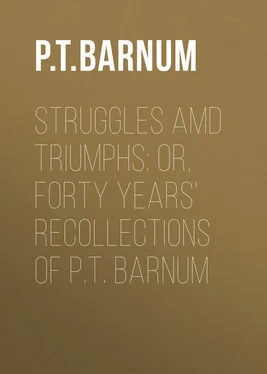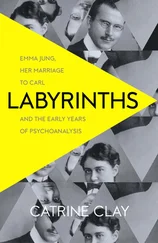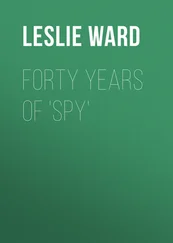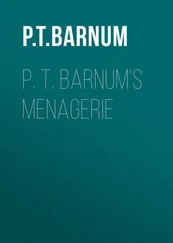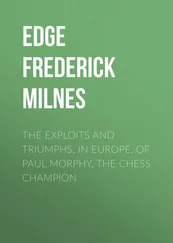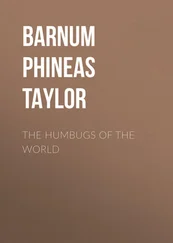Phineas Barnum - Struggles amd Triumphs - or, Forty Years' Recollections of P.T. Barnum
Здесь есть возможность читать онлайн «Phineas Barnum - Struggles amd Triumphs - or, Forty Years' Recollections of P.T. Barnum» — ознакомительный отрывок электронной книги совершенно бесплатно, а после прочтения отрывка купить полную версию. В некоторых случаях можно слушать аудио, скачать через торрент в формате fb2 и присутствует краткое содержание. Издательство: Иностранный паблик, Жанр: foreign_antique, foreign_prose, на английском языке. Описание произведения, (предисловие) а так же отзывы посетителей доступны на портале библиотеки ЛибКат.
- Название:Struggles amd Triumphs: or, Forty Years' Recollections of P.T. Barnum
- Автор:
- Издательство:Иностранный паблик
- Жанр:
- Год:неизвестен
- ISBN:нет данных
- Рейтинг книги:5 / 5. Голосов: 1
-
Избранное:Добавить в избранное
- Отзывы:
-
Ваша оценка:
- 100
- 1
- 2
- 3
- 4
- 5
Struggles amd Triumphs: or, Forty Years' Recollections of P.T. Barnum: краткое содержание, описание и аннотация
Предлагаем к чтению аннотацию, описание, краткое содержание или предисловие (зависит от того, что написал сам автор книги «Struggles amd Triumphs: or, Forty Years' Recollections of P.T. Barnum»). Если вы не нашли необходимую информацию о книге — напишите в комментариях, мы постараемся отыскать её.
Struggles amd Triumphs: or, Forty Years' Recollections of P.T. Barnum — читать онлайн ознакомительный отрывок
Ниже представлен текст книги, разбитый по страницам. Система сохранения места последней прочитанной страницы, позволяет с удобством читать онлайн бесплатно книгу «Struggles amd Triumphs: or, Forty Years' Recollections of P.T. Barnum», без необходимости каждый раз заново искать на чём Вы остановились. Поставьте закладку, и сможете в любой момент перейти на страницу, на которой закончили чтение.
Интервал:
Закладка:
Meanwhile, our advertiser, who was quite a wag, wrote back informing us of the difficulties of reaching a town on that part of our route and stating that he had made arrangements for us to stay over night on the plantation of “Lady Hayes,” and that although the country was sparsely settled, we could doubtless give a profitable performance to a fair audience.
Anticipating a fine time on this noble “plantation,” we started at four o’clock in the morning so as to arrive at one o’clock, thus avoiding the heat of the afternoon. Towards noon we came to a small river where some men, whom we afterwards discovered to be down-east Yankees, from Maine, were repairing a bridge. Every flooring plank had been taken up and it was impossible for our teams to cross. “Could the bridge be fixed so that we could go over?” I inquired; “No; it would take half a day, and meantime if we must cross, there was a place about sixteen miles down the river where we could get over.” “But we can’t go so far as that; we are under engagement to perform on Lady Hayes’s place to-night and we must cross here. Fix the bridge and we will pay you handsomely.”
They wanted no money, but if we would give them some tickets to our show they thought they might do something for us. I gladly consented and in fifteen minutes we crossed that bridge. The cunning rascals had seen our posters and knew we were coming; so they had taken up the planks of the bridge and had hidden them till they had levied upon us for tickets, when the floor was re-laid in a quarter of an hour. We laughed heartily at the trick and were very glad to cross so cheaply.
Towards dinner time, we began to look out for the grand mansion of “Lady Hayes,” and seeing nothing but little huts we quietly pursued our journey. At one o’clock – the time when we should have arrived at our destination – I became impatient and riding up to a poverty-stricken hovel and seeing a ragged, barefooted old woman, with her sleeves rolled up to her shoulders, who was washing clothes in front of the door, I inquired —
“Hallo! can you tell me where Lady Hayes lives?”
The old woman raised her head, which was covered with tangled locks and matted hair, and exclaimed —
“Hey?”
“No, Hayes, Lady Hayes; where is her plantation?”
“This is the place,” she answered; “I’m Widder Hayes and you are all to stay here to-night.”
We could not believe our ears or eyes; but after putting the dirty old woman through a severe cross-examination she finally produced a contract, signed by our advertiser, agreeing for board and lodging for the company and we found ourselves booked for the night. It appeared that our advertiser could find no better quarters in that forlorn section and he had indulged in a joke at our expense by exciting our appetites and imaginations in anticipation of the luxuries we should find in the magnificent mansion of “Lady Hayes.”
Joe Pentland grumbled, Bob White indulged in some very strong language, and Signor Vivalla laughed. He had travelled with his monkey and organ in Italy and could put up with any fare that offered. I took the disappointment philosophically, simply remarking that we must make the best of it and compensate ourselves when we reached a town next day.
When the old woman called us to dinner we crept into her hut and found that she had improvised benches at her table by placing boards upon the only four chairs in her possession, and at that, some of us were obliged to stand. The dinner consisted of a piece of boiled smoked bacon, a large dish of “greens,” and corn bread. Three plates, two knives, and three forks made up the entire table furniture and compelled a resort to our jack-knives. “A short horse is soon curried,” and dinner was speedily despatched. It did not seem possible for an audience to assemble in that forsaken quarter, and we concluded not to take the canvas tent out of the wagon.
By three o’clock, however, at least fifty persons had arrived on the ground to attend the night show and they reported “more a coming.” Accordingly we put up the tent and arranged our small stage and curtains, preparing seats for two hundred people. Those who had already arrived were mostly women, many of them from sixteen to twenty years old – poor, thin, sallow-faced creatures, wretchedly clad, some of them engaged in smoking pipes, while the rest were chewing snuff. This latter process was new to me; each chewer was provided with a short stick, softened at one end, by chewing it, and this stick was occasionally dipped into a snuff box and then stuck into the mouth, from whence it protruded like a cigar. The technical term for the proceeding is “snuff-dipping.”
Before night, stragglers had brought the number of people on Lady Hayes’ plantation up to one hundred, and soon after dark, we opened our exhibition to an audience of about two hundred. The men were a pale, haggard set of uncombed, uncouth creatures, whose constantly-moving jaws and the streams of colored saliva exuding from the corners of their mouths indicated that they were confirmed tobacco chewers. I never saw a more stupid and brutish assemblage of human beings. The performance delighted them; Pentland’s sleight-of-hand tricks astonished them and led them to declare that he must be in league with the evil one; Signor Vivalla’s ball-tossing and plate spinning elicited their loudest applause; and Bob White’s negro songs and break-downs made them fairly scream with laughter.
At last, the performance terminated and Pentland stepped forward and delivered the closing address, which he had repeated, word for word, a hundred times, and which was precisely as follows:
“Ladies and Gentlemen: The entertainments of the evening have now come to a conclusion, and, we hope, to your general satisfaction.”
But now came a dilemma; the meaning of this announcement was quite above the comprehension of the audience; they had not the remotest idea that the performance was finished, and they sat like statues.
With a hearty laugh at Pentland I told him that his language was not understood in this locality and that he must try again. He was chagrined, and declared that he would not say another word. Little Vivalla laughed, danced around like a monkey, and said, in his broken English:
“Ah, ha! Signor Pentland; you no speak good Eenglish, hah! These educated peoples no understand you, eh? By gar what d – d fools. Ah, Signor Barnum, let me speaks to them; I will make them jump double queek.”
I quite enjoyed the fun and said, “Well, Signor, go ahead.”
The little Italian jumped upon the stage and with a broad grimace and tremendous gesture exclaimed —
“Eet is feenish!”
He then retired behind the curtain, but, of course, the audience did not understand that he had told them the performance was finished. No one would have understood him. Hence, the spectators sat still, wondering what would come next. “By gar,” said Vivalla, losing his temper, “I will give them a hint,” and he loosened the cord and down fell the curtain on one side of the stage.
“Good, good,” cried out an enthusiastic “poor white,” giving his quid a fresh roll to the other side of his mouth, “now we are going to have something new.”
“I reckon they’s totin’ that plunder off to get ready for a dance,” said a delicate “dipper,” making a lunge into her box for another mouthful of the dust.
Things were becoming serious, and I saw that in order to get rid of these people they must be addressed in plain language; so, walking upon the stage, I simply said, making at the same time a motion for them to go, —
“It is all over; no more performance; the show is out.”
This was understood, but they still stood upon the order of their going and were loth to leave, especially as the, to them, extraordinary announcements of Pentland and Vivalla had prepared them for something fresh. Several days before, our band of musicians had left us, reducing our orchestra to an organ and pipes, ground and blown by an Italian whom we had picked up on the road. We had, in addition, a large bass drum, with no one to beat it, and this drum was espied by some of the audience in going out. Very soon I was waited upon by a masculine committee of three, who informed me that “the young ladies were very anxious to hear a tune on the big drum.” Pentland heard the request and replied, “I will accommodate the young ladies,” and strapping on the drum he took a stick in each hand and began to pound tremendously. Occasionally he would rap the sticks together, toss one of them into the air, catching it as it came down, and then pound away again like mad. In fact, he cut up all sorts of pranks with that big drum and when he was tired out and stopped, he was gratified at being told by the “young ladies” that they had never heard a big drum before, but he “played it splendid,” and they thought it was altogether the best part of the entire performance!
Читать дальшеИнтервал:
Закладка:
Похожие книги на «Struggles amd Triumphs: or, Forty Years' Recollections of P.T. Barnum»
Представляем Вашему вниманию похожие книги на «Struggles amd Triumphs: or, Forty Years' Recollections of P.T. Barnum» списком для выбора. Мы отобрали схожую по названию и смыслу литературу в надежде предоставить читателям больше вариантов отыскать новые, интересные, ещё непрочитанные произведения.
Обсуждение, отзывы о книге «Struggles amd Triumphs: or, Forty Years' Recollections of P.T. Barnum» и просто собственные мнения читателей. Оставьте ваши комментарии, напишите, что Вы думаете о произведении, его смысле или главных героях. Укажите что конкретно понравилось, а что нет, и почему Вы так считаете.
